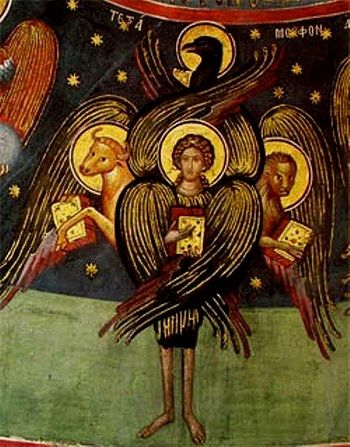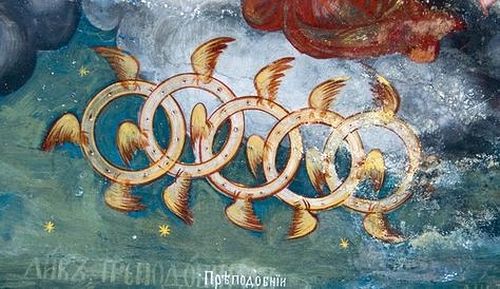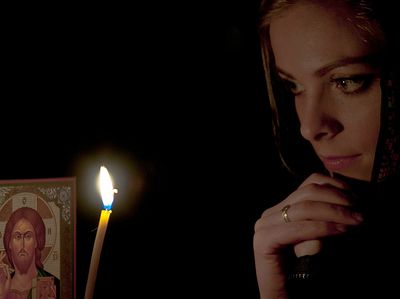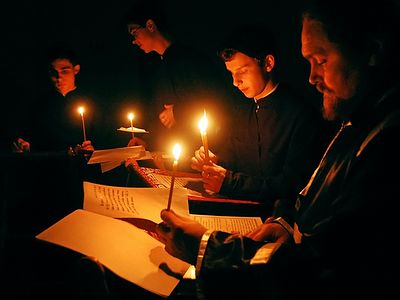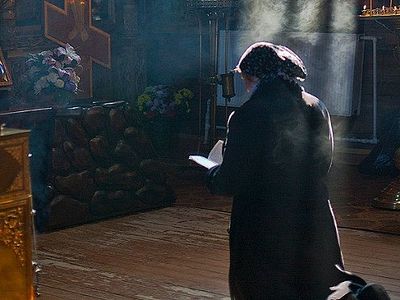Great Lent is wonderful time for increased, concentrated spiritual reading. We are spending less time planning and preparing culinary feasts, we try to distance ourselves more from the empty clatter of television programs and popular movies, and attend more church services. All of this together with the lightness of our Lenten diet aids us in focusing on our spiritual life, in comparing how we live with how the spiritual fathers and mothers of the Church lived, and in receiving their instructions more deeply. In keeping with this edifying trend, OrthoChristian.com will be posting daily homilies from The Fifty Spiritual Homilies of St. Macarius the Egytian, translated by A. J. Mason, D.D. (London: Society For Promoting Christian Knowledge, Northumberland Avenue, W.C., New York: The Macmillan Company, 1921).
St. Macarius the Egyptian (295-392 A.D), also known as St. Macarius the Great, was among the most authoritative Desert Fathers of Egypt, and a disciple of St. Anthony the Great. He is considered by the Church to be one of the founding fathers of monasticism.
The Eastern Orthodox Church celebrates his feast day on February 1/January 19. The Coptic Church at April 5 (Baramhat 27), and the return of his body to his monastery at Scetis on August 25 (Mesra 19). The Roman Catholic Church celebrates it on January 15.
* * *
An allegorical interpretation of the vision described in the prophet Ezekiel
1. The blessed prophet Ezekiel relates a glorious and inspired vision or apparition that he saw, and his description is that of a vision full of mysteries unspeakable. He saw in the plain a chariot of Cherubim, four spiritual living creatures. Each living creature had four faces, one the face of a lion, another the face of an eagle, another the face of a calf, and the fourth the face of a human being. To every face there were wings, so that there were no hinder parts to any of them. Their backs were full of eyes; their bellies likewise were thick set with eyes; there was no part about them that was not full of eyes. There were also wheels to every face, wheel within wheel. In the wheels there was a Spirit. And Ezekiel saw as it were the likeness of a man, and under his feet as it were a work of sapphire. The Cherubim-chariot1 and the living creatures bore the Master who rode upon them. Wheresoever He chose to go, it was with face forward. Beneath the Cherubim he saw as it were a man's hand supporting and carrying.
2. And this that the prophet saw was in substance true and certain, but it signified and foreshadowed something else, mysterious and divine a mystery hidden verily from ages and from generations2 but in the last times made manifest3 in the appearing of Christ. The mystery that he beheld was that of the soul, that was to receive her Lord, and to become a throne of glory for Him.4 For the soul that is privileged to be in communion with the Spirit of His light, and is irradiated by the beauty of the unspeakable glory of Him who has prepared her to be a seat and a dwelling for Himself, becomes all light, all face, all eye; and there is no part of her that is not full of the spiritual eyes of light. That is to say, there is no part of her darkened, but she is all throughout wrought into light and spirit, and is full of eyes all over, and has no such thing as a back part, but in every direction is face forward, with the unspeakable beauty of the glory of the light of Christ mounted and riding upon her. As the sun is of one likeness all over, without any part behind or inferior, but is all glorified with light throughout, and is, indeed, all light, with no difference between the parts, or as fire, the very light of the fire, is alike all over, having in it no first or last, or greater or less, so also the soul that is perfectly irradiated by the unspeakable beauty of the glory of the light of the face of Christ, and is perfectly in communion with the Holy Ghost, and is privileged to be the dwelling-place and throne of God, becomes all eye, all light, all face, all glory, all spirit, being made so by Christ, who drives, and guides, and carries, and bears her about, and graces and adorns her thus with spiritual beauty; for it says, the hand of a man was under the Cherubim,5 because He it is that is carried upon her and directs her. The four living creatures that bore the chariot were a symbol of the ruling factors6 of the soul. As the eagle is the king of birds, and the lion of wild beasts, and the bull of tame ones, and man of creatures in general, so the soul also has its ruling factors. They are the will, the conscience, the intelligence, and the faculty of love. By these the chariot of the soul is controlled, and upon these God rests. According to another interpretation the symbolism is applied to the church of the saints in heaven. As it is here said that the living creatures were exceeding high, and full of eyes, and it was not possible for any one to apprehend the number of the eyes, or the height, because the knowledge of these was not given; and as it is with the stars in the sky, to see and wonder at them was given to all men, but to know and apprehend the number was not given; and with the plants of the earth, to enjoy them was given to all, but it is impossible for any one to know the number of them; so with regard to the church of the saints in heaven, to enter into it and enjoy it was given to all who will but strive, but how to see and apprehend the number is reserved for God alone to know.
The Rider, then, is conveyed and carried by the chariot or throne of the living creatures, which are all eye, or, in other words, by every soul that has become His throne and seat, and is now eye and light. He is mounted thereon, and governs her with the reins of the Spirit, and guides her according to His understanding. For as the spiritual living creatures went not whither they were minded to go, but whither He that sat upon them and directed them knew and willed, so here it is He that holds the reins and drives by His Spirit, and they go accordingly, not by their own will when they are minded to go through heaven. Sometimes, discarding the body, He drives and takes the soul in thought through heaven; sometimes, when so it pleases Him, He comes into the body and its affairs; sometimes, when so minded, to the ends of the earth, and discovers to the soul mysteries revealed. Oh, the noble and good and only true Charioteer! In like manner shall our bodies also be privileged at the resurrection, the soul being thus pre-glorified even now, and mingled with the Spirit.
4. That the souls of the righteous become heavenly light, the Lord Himself told the apostles, when He said, Ye are the light of the world7 He first wrought them into light, and ordained that through them the world should be enlightened. Neither do men light a lamp, He says, and put it under the bushel, but on the lampstand, and it giveth light to all that are in the hotise.8 Let your light so shine before men. In other words, Hide not the gift which ye have received from Me, but give to all that are minded to receive it. Again, The light of the body is the eye; if thine eye be full of light, thy whole body is enlightened, but if thine eye be evil, thy whole body is dark. If therefore the light that is in thee be darkness, how great is that darkness? As the eyes are the light of the body, and, so long as the eyes are well, the whole body is enlightened, but, if any accident befalls them and they are darkened, the whole body is in darkness, so the apostles were set to be the eyes and light of the whole world. The Lord therefore charged them by this saying, If ye who are the light of the body, stand fast and turn not aside, behold, the whole body of the world is enlightened; but if ye who are the light are darkened, how great is that darkness, which is nothing less than the world.9 So the apostles, being themselves light, administered light to those, who believed, enlightening their hearts with that heavenly light of the Spirit by which they were themselves enlightened.
5. And being themselves salt they seasoned and salted every believing soul with the salt of the Holy Ghost; for the Lord said to them, Ye are the salt of the earth,10 1 meaning by earth the hearts of men. They administered in the souls of men the heavenly salt of the Spirit, seasoning them and rendering them free from corruption and from going bad, instead of that unsavoury condition they were in. Flesh, if it be not salted, corrupts and is filled with ill savour, so that every one turns from the evil odour, and worms creep into the corrupted flesh, and there dwell, and feed, and burrow; but when the salt comes, the worms that dwell there are destroyed, and the offensive smell is at an end; for it is the property of salt to kill worms and to banish an ill smell. In the same manner, every soul that is not salted with the Holy Ghost, and does not partake of the heavenly salt, which is the power of God, corrupts, and is filled with the ill odour of bad thoughts, so that the countenance of God turns from the dreadful odour of the vain thoughts of darkness, and from the passions that dwell in such a soul. The evil and dreadful worms, which are the spirits of wickedness, and the powers of darkness, walk up and down in it, and dwell there, and burrow, and creep, and devour it, and bring it to decay. My wounds stink and are corrupt, says the Psalm.11 But when the soul flies to God for succour, and believes, and asks for the salt of life, which is the good Spirit that loves mankind, then the heavenly salt comes, and kills those dreadful worms, and banishes the ill savour, and cleanses the soul by the effectual working of its power, and thus the soul is made sound and free from deterioration by that true salt, and is restored to being useful and serviceable to the heavenly Lord. That is why in the Law God, using a figure, commanded that every sacrifice should be salted with salt.12
6. First the sacrifice must be slain by the priest, and die, then cut in pieces and salted, and then laid upon the fire. Unless the priest first slays the lamb, so that it dies, it is neither salted nor brought to the Lord for a burnt offering. Thus our soul also must come to Christ, the true High Priest, and be slain by Him, and die to its own mode of thought, and to the evil life of sin which it lived before. The life must go out of it that life of bad passions. As the body, when the soul goes out of it, is dead, and lives no longer with the life which it lived before, and neither hears nor walks, so when Christ, our heavenly High Priest, by the grace of His power, slays our life to the world and puts it to death, it dies to the life of evil which it lived, and no longer hears, nor speaks, nor maintains any citizenship in the darkness of sin, because the evil passions which were in its soul have by grace gone out of it. The apostle cries, “The world is crucified to me, and I unto the world”* The soul which yet lives in the world, and in the darkness of sin, and has not been done to death by Him, but still has the soul of wickedness in it, that is, the activity of the darkness of the passions of evil, and is governed by it, does not belong to the body of Christ, does not belong to the body of light, but is indeed the body of darkness, and is still part and parcel of the darkness; while they who have the soul of light, that is, the power of the Holy Spirit, form part and parcel of the light.
7. But some one may say, How is it that" you call the soul the body of darkness, when it is no creation of the darkness? Attend, and understand me aright. As the coat or garment that you have on was made by another, and you wear it, and your house was created or built by another, and you live in it, so when Adam transgressed the commandment of God, and hearkened to the wicked serpent, he was sold, or sold himself, to the devil, and the evil one put on his soul like a garment his soul, that fair (1 Gal. 6:14) creation, which God had fashioned after His own image. Thus the apostle says, Having stripped the principalities and powers, He triumphed over them in the cross.13 This was the purpose of the Lord's coming, that He might cast them out, and recover His own house and temple, man. For this reason, the soul is called the body of the darkness of wickedness, as long as the darkness of sin is in it, because there it lives to the evil world of darkness, and is there held fast. So Paul calls it the body of sin, the body of death, saying, that the body of sin might be destroyed14 and “Who shall deliver me from the body of this death?”15 On the other hand, the soul which has believed God, and has been rescued from sin, and done to death out of the life of darkness, and has received the light of the Holy Spirit as its life, and by that means has come to life indeed, spends its existence in the same for ever after, because it is there held fast by the light of the Godhead. For the soul in itself is neither of the nature of the Godhead, nor of the nature of the darkness of wickedness, but is a creature intellectual, beauteous, great, and wonderful, a fair likeness and image of God. It was through the transgression that the wickedness of the passions of darkness entered into it.
8. Whichever the soul, then, is mixed with, it is thence- forward united with the same in the motions of the will. Either it has the light of God within it, and lives in the same, in all virtues, and belongs to the light of rest, or it has the darkness of sin, and meets with condemnation. The soul that desires to live with God in rest and eternal light must come, as was said before, to Christ the true High Priest, and be slain, and die to the world, and to the former life of the darkness of wickedness, and be translated into another life and to a conversation that is divine. As when a man dies in some city, he neither hears the voice of the people there, nor their talking, nor the noise that they make, but is once for all dead, and is translated to another region, where there are no voices and none of the cries of that city, even so the soul, when it is once slain and dead to that city of the evil passions in which it dwells and lives, hears no longer within itself the voice of the communings of darkness; no longer is heard the talking and crying of vain disputation, or of the hubbub of the spirits of darkness; but it is translated into a city all full of goodness and peace, into the city of the light of the Godhead, and there it lives, and hears, and there it has its citizenship, and talks, and communes, and there it works spiritual works, that are worthy of God.
9. Let us therefore pray that we ourselves may be slain through His power, and die to the world of the wickedness of darkness, and that the spirit of sin may be destroyed in us, and that we may put on and receive the soul of the heavenly Spirit, and be translated from the wickedness of darkness into the light of Christ, and may rest in life through world after world. For as on the race-course the chariots run, and the one that gets the start of the other is a clog, and check, and hindrance to the other, so that it cannot make progress and get to victory first, so do the thoughts of the soul and of sin run in man. If the thought of sin happens to get the start, it clogs and checks and hampers and hinders the soul, so that it cannot get near to God and carry off the victory from it. But where the Lord mounts and takes the reins of the soul into His own hands, He always wins, skillfully managing and guiding the chariot of the soul into a heavenly and inspired mind forever. He does not war against wickedness; having always supreme power and authority in Himself, He works Himself the victory. So the Cherubim are driven, not where they are inclined of themselves to go, but where the Rider or Charioteer directs. Where He wills, they go; and He supports them. The hand of a man, it says, was under them. These holy souls are driven and guided by the Spirit of Christ, who holds the reins, whithersoever He pleases when He pleases, in heavenly communings; when He pleases, that it should be in the body; where He pleases, there they minister. As the wings are the feet of the bird, so the heavenly light of the Spirit takes up the wings of the thoughts of worthy souls, guiding and managing as He knows best.
10. When thou hearest these things, therefore, look to thyself, whether thou art in deed and in truth possessed of them in thine own soul. They are not mere words spoken; it is a work of truth going on in thy soul. If thou hast it not, but art destitute of such spiritual good things, thou oughtest to have continual grief and sorrow and trouble, as one still dead to the kingdom. Like one that is wounded, be always crying to the Lord, and ask in faith, that this true life may be vouchsafed even to thee. When God made this body of ours, He did not grant to it that it should have life either from His own nature or from the body itself, nor meat and drink, raiment and shoes; He appointed that it should have all the supplies of life from without, making the body in itself quite naked, and it is impossible for the body to live at all apart from things outside itself, without food and drink and clothing. If it attempts to subsist upon its own nature alone, taking nothing from without, it wastes and perishes. In the same manner is it with the soul also. It has not the divine light, though it is created after the image of God. So has He ordered its conditions, and has been pleased that it should not have eternal life of its own nature; but of His Godhead, of His Spirit, of His light, it has spiritual meat and drink, and heavenly clothing, which are the soul's life, the life indeed.
11. As, then, we have seen that the body's life is not from itself, but from without, from the earth, and apart from the things without it is impossible for it to live, so also, unless the soul be born now into that land of the living l and spiritually draw nourishment from it and make increase, growing up unto the Lord, and be arrayed from the Godhead with the ineffable raiment of heavenly beauty, without that sustenance it is impossible for it to live, of itself, in enjoyment and rest. The divine nature contains the bread of life, which said, “I am the bread of life16 and living water? 17 and wine that maketh glad the heart of man18 and the oil of gladness,19 and the whole variety of the food of the heavenly Spirit, and the heavenly raiment of light which comes from God. In these things the eternal life of the soul consists. Woe to the body when it stands upon its own nature, because then it wastes and dies; and woe to the soul if it takes its stand upon nothing but its own nature, and puts its trust in nothing but its own works, not having the fellowship of the Spirit of God, because it dies, not having the eternal life of the Godhead vouchsafed to it. When men are sick, as soon as the body is no longer able to receive nourishment, all hopes of them are given over, and all true friends and kinsfolk and lovers are in tears. In the same way, God and the holy angels are in tears over souls that are not nourished with the heavenly nourishment of the Spirit, and have not come to life in incorruption. These things, I say again, are not merely words that are spoken, but the work of spiritual life, the work of truth accomplished upon the soul that is worthy and faithful.
12. If then thou art become a throne of God, and the heavenly Charioteer has mounted thee, and thy whole soul has become a spiritual eye, and thy whole soul light20 and if thou hast been nourished with that nourishment of the Spirit, and if thou hast been made to drink of the Living Water, and if thou hast put on the garments of the ineffable light; if thine inward man is established in the experience and full assurance of all these things, behold, thou livest, thou livest the eternal life indeed, and thy soul from henceforth is at rest with the Lord. Behold, thou hast received these things from the Lord and possessest them in truth, that thou mayest live the true life. But if thou art conscious that thou hast none of these things, then weep, and mourn, and lament, because even yet thou hast not found the eternal heavenly riches. Be in trouble therefore for thy penury, beseeching the Lord night and day, because thou hast stopped short in the dreadful poverty of sin. Would to God that a man had even gained as much as this trouble because of his poverty that we did not go on without a care, as though we were full; because one that is seriously troubled, and seeks and asks of the Lord continually, will soon find redemption and the heavenly riches, as the Lord said at the conclusion of His discourse of the Unjust Judge and the Widow, How much more shall God avenge them that cry to Him night and day? Yea, I say unto you, He shall avenge them speedily.21 To whom be glory and power for ever. Amen.
